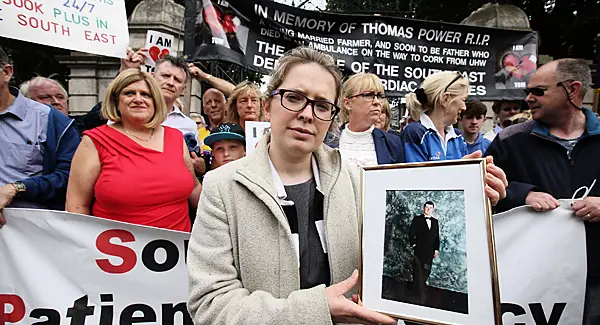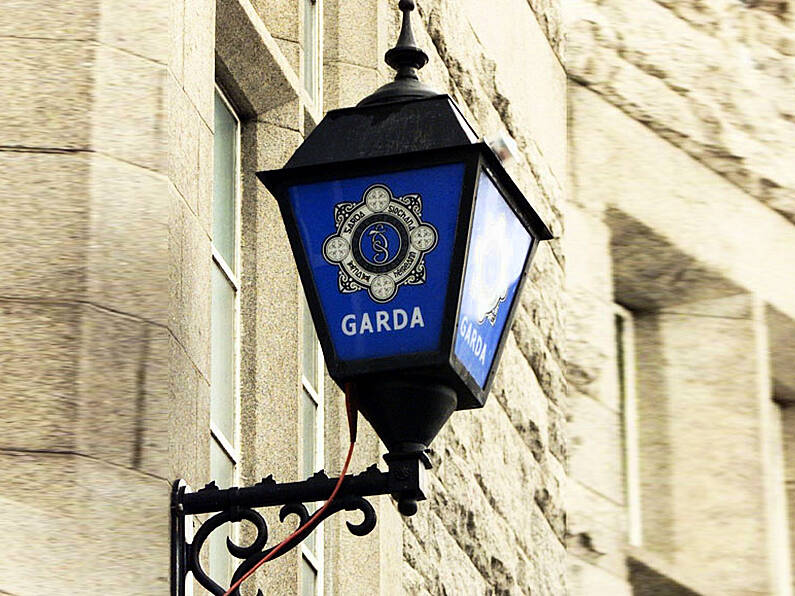By Conor Kane
A sister of the man who died when the cath lab in Waterford was closed when he became ill has called for a “modular” catheterisation laboratory announced for the region today to be open around the clock.
The Minister for Health Simon Harris has agreed today to provide the “modular” catheterisation laboratory at University Hospital Waterford to allow for increased numbers of diagnostic and follow-up procedures for cardiac patients.
However, it is understood the new facility will not operate on a round-the-clock basis and campaigners will still be pressing for a permanent, second, cath lab at UHW to cater for heart attack victims.
A sister of the late Tom Power, Catherine Power, said there are “still lives at risk of being lost at the side of the road” despite today’s announcement.

Catherine Power.
Thomas Power died last year after suffering a cardiac arrest, he had to be transferred to Cork as the Waterford cath lab was closed when he became ill.
“I will have to see it to believe it,” she said, and pointed out that the service is “still not 24/7” as campaigners in the region believe the cath lab should be available round-the-clock, seven days a week.
Independent TD and Minister of State John Halligan, who has campaigned alongside other southeast TDs and senators for years for a second permanent “cath lab” to be provided alongside the existing facility at Waterford which currently runs on a 9-5 basis, Monday to Friday, said the modular lab will improve waiting list times in the southeast.
Campaigners looking for a second cath lab have held marches and other protest events in the Waterford area and their cause was highlighted last year by the death of local farmer Tom Power (40). He arrived at UHW on a Sunday afternoon, complaining of chest pains, but as the cath lab wasn’t open at the weekend was put into an ambulance for transfer to Cork, and died in the ambulance on the way.

Thomas Power with his wife Bernadette.
John Halligan said today that Minister Harris has asked his department “to proceed without delay to engage with the HSE on the next steps in providing a modular lab”.
However, it will be next year at least before the new facility is in place as the HSE will have to go through the tendering, project design, planning, commissioning and construction phases.
A catheterisation laboratory is used to perform certain diagnostic procedures in patients complaining of heart problems, such as angiograms, and interventions to relieve acute episodes.
A mobile cath lab has been in place in UHW since last year to relieve the pressure on the existing, permanent, lab, but can only be used for diagnostic purposes and not follow-up procedures.
John Halligan said the new modular lab will increase capacity and provide “immediate access” to the main cath lab for emergency patients presenting with heart attacks.
"The mobile lab has helped to decrease the number of patients on the cardiac diagnostic waiting list from 670 in January 0f 2017 to 370 by last January, with the majority of patients waiting 0-3 months."
“Despite this success, however, the mobile lab is limited to use for diagnostic angiograms only and does not provide facilities for more complex procedures,” Mr Halligan said. “Of the patients who received diagnostic angiograms, around 30% require follow-on procedures and the increased number of people who received a diagnosis in the mobile lab has hugely increased the pressure on the main cath lab.”
He and other Oireachtas members from across the southeast have been urging the minister to provide a new cath lab to relieve this pressure.
Final costings for the lab have not yet been completed but Mr Halligan said funding, including staffing costs, will be “ring-fenced” in the 2019 budgetary estimates.
The mobile lab will remain on site in the meantime while an ongoing National Review of Specialist Cardiac Services, to include examining the need or otherwise for a second permanent cath lab in Waterford, is continuing.
“It is important to note that both the mobile lab and the modular lab are short-term solutions to address wait times in the south-east whilst simultaneously demonstrating the demand for increased services. The real goal always has been – and remains – a second permanent cath lab and the provision of 24/7 cardiac care at UHW,” Mr Halligan said.






